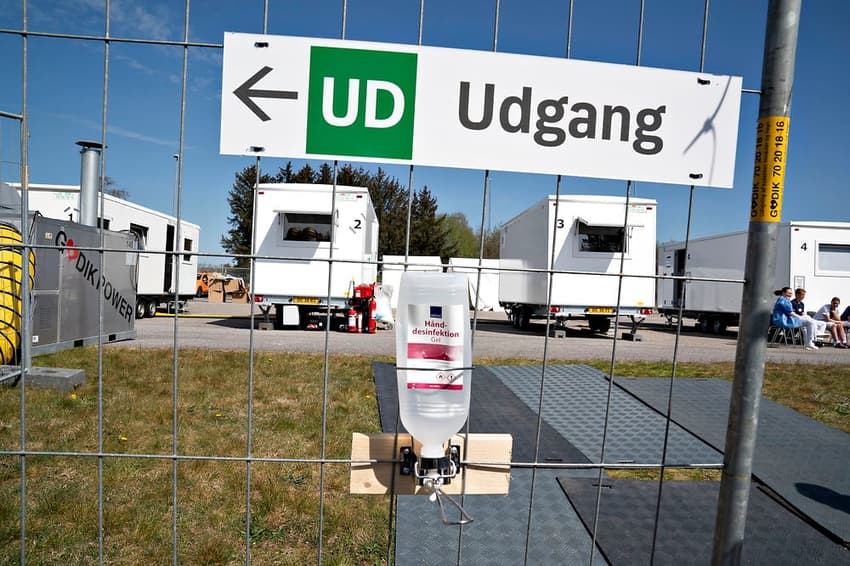Denmark says Covid-19 testing now only needed for 'special medical reasons'

The Danish Health Authority has changed its recommendations on when people with suspected Covid-19 should be tested for the coronavirus.
In a statement released on Thursday, the health authority said that Covid-19 testing was now only recommended if there is a “special medical reason” for doing so.
“We can now make do with only going for a test if there is a special medical reason for doing so,” the head of department with the Danish Health Authority Bolette Søborg said in the statement.
Special medical reasons can include situations in which the result of a test can confirm the need for early treatment for Covid-19 to reduce the risk of developing serious disease.
Certain demographics are more likely to need early treatment for the coronavirus. These include people aged over 65 and others who are at risk of serious illness with Covid-19 due to existing medical conditions. Pregnant women are also considered part of this group.
“It is therefore important that this group goes for a test as soon as possible if they get symptoms of Covid-19 and feel unwell, and that they contact their doctor,” Søborg said.
The new guidelines mean that large parts of the Danish population no longer need to take a test if they experience Covid-19 symptoms. Neither to close contacts to people with Covid-19 need to take a test.
The health authority said good control of the Covid-19 epidemic in Denmark now means that testing rules can be relaxed.
Infection numbers have fallen and the number of new hospitalisations with the virus is low and stable, the authority said.
Testing is still needed more frequently in the health and social care sector, however.
That includes parts of the health service and elderly care in which the presence of vulnerable people means outbreaks must be kept under control.
Contact tracing will also be initiated when infections are detected in those areas.
The Danish Health Authority said it remains important to limit transmission of Covid-19 through good hygiene practises.
People who feel unwell should continue to stay home so as not to risk infecting others, it said.
READ ALSO: Covid infections in Denmark at lowest since January
Comments
See Also
In a statement released on Thursday, the health authority said that Covid-19 testing was now only recommended if there is a “special medical reason” for doing so.
“We can now make do with only going for a test if there is a special medical reason for doing so,” the head of department with the Danish Health Authority Bolette Søborg said in the statement.
Special medical reasons can include situations in which the result of a test can confirm the need for early treatment for Covid-19 to reduce the risk of developing serious disease.
Certain demographics are more likely to need early treatment for the coronavirus. These include people aged over 65 and others who are at risk of serious illness with Covid-19 due to existing medical conditions. Pregnant women are also considered part of this group.
“It is therefore important that this group goes for a test as soon as possible if they get symptoms of Covid-19 and feel unwell, and that they contact their doctor,” Søborg said.
The new guidelines mean that large parts of the Danish population no longer need to take a test if they experience Covid-19 symptoms. Neither to close contacts to people with Covid-19 need to take a test.
The health authority said good control of the Covid-19 epidemic in Denmark now means that testing rules can be relaxed.
Infection numbers have fallen and the number of new hospitalisations with the virus is low and stable, the authority said.
Testing is still needed more frequently in the health and social care sector, however.
That includes parts of the health service and elderly care in which the presence of vulnerable people means outbreaks must be kept under control.
Contact tracing will also be initiated when infections are detected in those areas.
The Danish Health Authority said it remains important to limit transmission of Covid-19 through good hygiene practises.
People who feel unwell should continue to stay home so as not to risk infecting others, it said.
READ ALSO: Covid infections in Denmark at lowest since January
Join the conversation in our comments section below. Share your own views and experience and if you have a question or suggestion for our journalists then email us at [email protected].
Please keep comments civil, constructive and on topic – and make sure to read our terms of use before getting involved.
Please log in here to leave a comment.